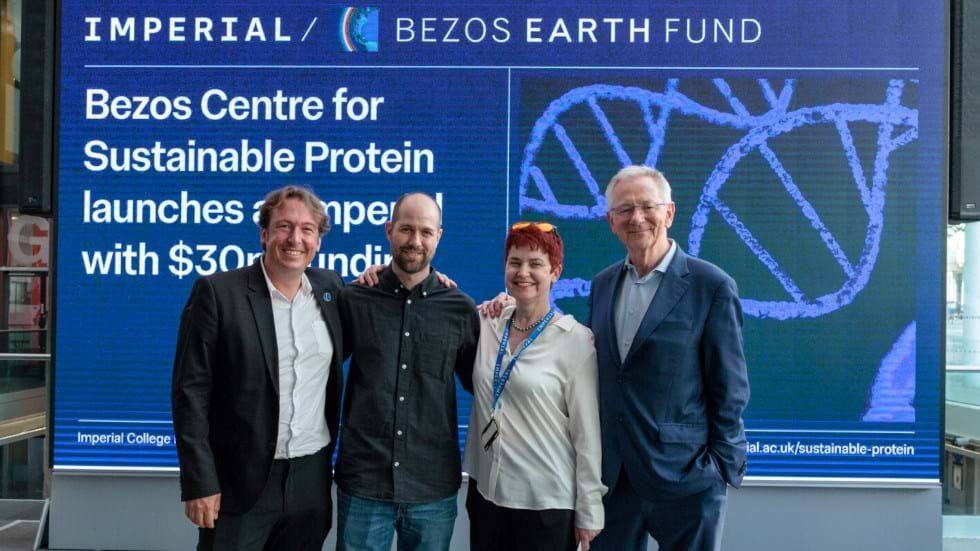Bezos funds US$30m sustainable protein lab as Imperial engineers seek to revolutionise food production

A US$30m centre for sustainable protein has been launched at Imperial College London as engineers work to develop the processes and new foods needed to reduce the harmful impacts of food production.
Funded by Amazon owner Jeff Bezos through his US$10bn Earth Fund, the Bezos Centre for Sustainable Protein will work to advance research into precision fermentation, cultivated meat, bioprocessing, automation, AI and machine learning.
Director of the new centre, Rodrigo Ledesma-Amaro, who has a background in chemical engineering and biotechnology, said: “The global challenge that the centre will focus on is the creation of food that is both environmentally friendly and accessible to everyone.”
There is an urgent need to make food production more sustainable and resilient to the impacts of climate change. A study published in Nature Food in 2021, estimated that food systems are responsible for 34% of global greenhouse gas emissions.
Speaking at the centre’s launch, Imperial vice-provost Mary Ryan said: “We are faced with this double threat: our food systems are uniquely vulnerable and uniquely causing the climate crisis.”
A study published in Nature Climate Change last year noted that more than 80% of future warming from food consumption will be from meat, rice, and dairy products. Therefore, efforts to reduce emissions from the production, consumption, and waste of these food groups can play a major role in limiting climate change.
Andrew Steer, CEO of the Bezos Earth Fund, said: “By 2050 the world population will be over 10bn, so now is the time to rethink the way we produce and consume food. This work will help ensure that our future includes more protein options – and that they taste great, are nutritious and come at low cost.”
Engineering biology is key
Protein is an essential element of the human diet consumed through both animal and plant-based sources including meat, fish, eggs, and beans. Efforts to find and popularise alternatives to meat are likely to be key to achieving climate targets as its production leads to extensive land-use change, emissions and water use.
The centre will look at technologies to create greener alternative proteins using microbial fermentation, which can produce proteins and nutrients for food formulations, and lab-grown meat cultivated from animal cells.
Imperial says engineering biology is needed to help efficiently transform these proteins into healthy and tasty food. Other components will also need to be produced more sustainably, including healthier fats, which will then need to combine with flavours, colourants, and vitamins to produce foods people want to eat.
Engineering biology is an emerging area of technology that applies engineering principles to biological systems to design, build, and manufacture cells and products. In IChemE’s recent review of how chemical engineers can help society meet the UN Sustainable Development Goals, it noted the key role chemical engineers have to play in the scaleup and industrialisation of its techniques and called on more support from policymakers.
Imperial said the centre will use a combination of rational and computational-guided engineering strategies with automation at biofoundries – where cells are turned into mini-factories producing useful products – to accelerate the development and scaling up of new bio-based processes.
Just how more environmentally friendly cultivated meat can be compared to traditionally reared meat has yet to be seen and will depend on the production techniques that win out. A study into the life-cycle assessment of cultivated meat made headlines last year when it said emissions from lab-grown meat could be orders of magnitude higher. The study has to been peer-reviewed and drew criticism from researchers who questioned the assumptions made in the comparison, including the need to use pharmaceutical-grade ingredients and intense purification steps. An earlier peer-reviewed study focusing on food-grade techniques suggested the emissions would be lower.
Ledesma-Amaro, said: “The centre’s ethos is that bio-engineered solutions can – and should – be both planet- and people-positive. Imperial is uniquely positioned to harness the potential of engineering biology to accelerate the alt-protein revolution and transform global food systems.”
He added that the centre also has a key role in cultivating the next generation of scientists and engineers needed to help drive the work forward.
Centre partners
The centre spans seven Imperial departments including chemical engineering where professors Karen Polizzi and Cleo Kontoravdi are working on cultivated meat. The centre will form a hub linked to partners at Cellular Agriculture Manufacturing Hub at UCL and Aberystwyth University, the Food Centre at Reading University, and the Growing Kent & Medway consortium involving the National Institute of Agricultural Botany and the Universities of Kent and Greenwich. There are also international partners at the Technical University of Denmark, Tufts University in the US, and the National University of Singapore.
Recent Editions
Catch up on the latest news, views and jobs from The Chemical Engineer. Below are the four latest issues. View a wider selection of the archive from within the Magazine section of this site.




